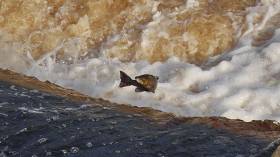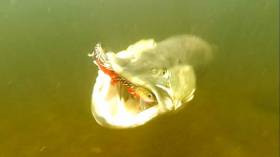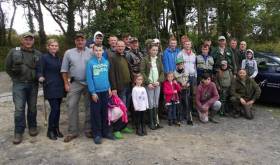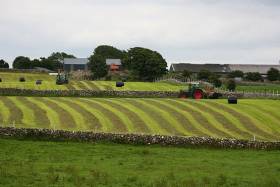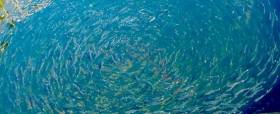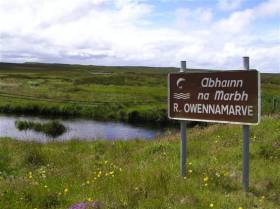Displaying items by tag: IFI
Minister Announces New Sea Trout Tagging Scheme & Conservation Measures
#Angling - Sean Kyne TD, Minister of State at the Department of Communications, Climate Action and Environment, has given statutory notice of his intention to make the Wild Salmon and Sea Trout Tagging Scheme Regulations 2016 to provide for the management of the wild salmon and sea trout fishery by Inland Fisheries Ireland from 1 January 2017.
A copy of the draft regulations is available from the department website and and is also open for public inspection at the offices of the department in Cavan and at the offices of Inland Fisheries Ireland.
Any person may submit observations or objections to the draft regulations at any time during the period of 30 days concluding on 11 December 2016 either by e-mail to [email protected] or to the following address:
Inland Fisheries Division,
Department of Communications, Climate Action and Environment,
Elm House,
Earlsvale Road,
Cavan Town
H12 A8H7
Ireland
Tel: 01 6783071 / Lo-call 1890 449 900 Extension 3071
All submissions received will be published on the department's website following the conclusion of the consultation period.
Public Consultation On Pike Management In Wild Brown Trout Fisheries
#Angling - Inland Fisheries Ireland has launched a public consultation on the management of pike in designated wild brown trout fisheries.
It follows the IFI board’s decision to commence a review period of its policies on the management of wild brown trout, pike and bass that were initially developed in 2014.
IFI says it welcomes the opportunity to engage with stakeholders and their “diverse opinions” on the issue via their submissions, which will be reviewed and considered by the newly appointed Pike and Wild Brown Trout Policy Review Group that comprises a range of representatives from all disciplines within the fisheries agency.
“Over two years ago, we developed policies which have an impact on how we manage the pike species in fisheries which are predominately home to wild brown trout,” said IFI chief executive Dr Ciaran Byrne. “This review and public consultation period allows us to reflect on those policies and to hear from our stakeholders on their views on this issue.
“We know there are varied opinions out there and this is the chance for the public to have their say. This public consultation will help inform our future policies and work in this area.”
Information on the consultation is available from the IFI website or from any IFI office. The public consultation period will run for four weeks until 5pm on Thursday 1 December.
All submissions must be made in writing and will be published on the website. Submissions should be marked ‘Public Consultation – Pike Management in Brown Trout Fisheries’ and can be submitted by email to [email protected] or by post to:
Policy Review
Inland Fisheries Ireland
Sunnyside House
Macroom, Co Cork
#Angling - Inland Fisheries Ireland (IFI) is looking for public feedback via an online survey on its current funding programmes, having awarded over €3.4 million to angling projects and fisheries initiatives in communities nationwide over the past five years.
Current funding channels include the Salmon Conservation Fund and the Midlands Fisheries Fund, which see IFI redistribute income gained from permits and licenses, as well as IFI’s Sponsorship Programme.
IFI is now looking to consult with previous recipients of funding alongside interested parties and potential applicants, on whether the funding programmes are meeting requirements and if there are any changes which could be made to improve them.
Sean Kyne TD, Minister of State with responsibility for the Inland fisheries sector, encouraged stakeholders to take part in the online survey.
“The programmes ensure that stakeholders are facilitated and partnered to assist in the strategic development of fisheries and angling developments,” he said, adding that “the angling sector is worth €836 million to Ireland’s economy annually, supporting upwards of 11,000 jobs.”
This month IFI will invite applications for funding for angling access improvement works. These projects should contribute to the delivery of an accessible and sustainable world class inland fisheries and sea angling resource and will form part of the National Strategy for Angling Development.
While this fund will be limited to ‘shovel ready’ projects on the river bank, further funding opportunities for more complex capital projects are likely early in 2017.
The funding survey should take less than five minutes to complete with all participants entered into a draw to win one of three €50 tackle shop vouchers. The survey is open to angling clubs, commercial fishermen, fishery promoters, community and local development groups as well as private individuals.
To find out more information about IFI’s funding programmes and to take the short funding survey, visit www.fisheriesireland.ie/fundingsurvey.
The survey will be live on the IFI website until Tuesday 8 November.
Young Anglers From Boyne Valley Enjoy Fishing Trip At Courtlough
#Angling - Members of the Boyne Valley Fishing Hub, which comprises clubs along the River Boyne with a focus on developing youth angling, enjoyed a fishing trip to Courtlough Trout Fishery earlier this month.
Some 30 experienced and novice anglers gave and attended lessons on fly fishing in the event, sponsored by Inland Fisheries Ireland (IFI), the Boyne Valley Fishing Hub and Courtlough Trout Fisheries Balbriggan, that was aimed at engaging potential young anglers in the Boyne Valley area.
Conditions on the day were difficult, but all anglers had success catching at least one fish each at the rainbow trout fishery, which consists of four acres of spring-fed lakes.
Topics covered during the fly fishing lessons included set-ups, fly choice and casting. Prizes were awarded at the end of the event to those who were particularly lucky on the day.
The event was facilitated as part of IFI’s Dublin Angling Initiative, which aims to promote, develop and improve angling in the greater Dublin area.
During the summer months, young people from national and secondary schools, summer projects and youth services are taken out on fishing courses.
To date, thousands of young people have been introduced to sea, coarse and game angling and the initiative has been a catalyst in setting up fishing clubs for many of these young people.
“It was fantastic to see so many anglers of different ages from Boyne Valley Fishing Hub take part in this trip," said Dublin Angling Initiative co-ordinator Oisin Cahill.
"Angling can be enjoyed at any age or ability and we are always welcoming young people who might be interested to consider trying it out."
Cahill added that the Dublin Angling Initiative "also engages young people around important issues such as conservation and the protection of our natural resources, which includes our fisheries.
"We hope this learning around biodiversity protection is something that will stay with them for the rest of their lives. We need to start engaging communities on these issues and getting the public out there to see what it is all about is a vital first step.”
For more on the Dublin Angling Initiative, visit www.fisheriesireland.ie or contact Oisin Cahill at [email protected]. For more information on Courtlough Trout Fisheries, contact Garrett on 0872712704. The Boyne Valley Fishing Hub can be found on Facebook HERE.
#Pollution - Inland Fisheries Ireland (IFI) has issued an appeal to all farmers to be vigilant when harvesting silage and spreading slurry to avoid water pollution.
Silage operations are ongoing all summer and silage effluent has the potential to cause devastating pollution in streams and rivers. Silage effluent is one of the most polluting substances to threaten the environment and can cause massive fish kills if it enters a watercourse.
Slurry spread on grassland over the summer months can also wipe out fish and invertebrate life if allowed to enter a stream. Water levels in streams and rivers are low in the summer months and have less dilution capacity, so are particularly vulnerable to pollution at this time.
“The fisheries service is appealing to all farmers and contractors to be careful that no silage effluent is allowed to run off into drains or watercourses," said Dr Greg Forde, head of operations at IFI.
"Round bales are the most environmentally friendly way to store silage. However, if a silage pit is used, it must be properly lined to prevent leakage.
“Good farmyard management will help to prevent accidental run-off and protect the local environment. Slurry spreading should only be carried out in dry weather, and not when heavy rain is forecast. It should never be spread close to a watercourse, and tanks should never be cleaned beside a stream or river.
Dr Forde addd that IFI “is grateful to the farming community for its co-operation at this busy time of year, and for its assistance in maintaining a clean and healthy environment in our lakes and rivers.”
IFI has a confidential hotline number to enable members of the general public to report incidents of water pollution, fish kills and illegal fishing or angling at 1890 34 74 24 or 1890 FISH 24.
#Angling - Inland Fisheries Ireland (IFI) is seeking submissions from interested parties in respect of a number of proposed Bye-laws pertaining to the Eastern and Neagh Bann International River Basin Districts.
IFI intends requesting the minister to introduce these Bye-laws with a view to enabling improved management of these waters in a sustainable manner.
The key Bye-laws to be introduced and the areas being considered for review are as follows:
- To set the annual close season for angling for all trout species for Lough Lene, Co. Westmeath to the period 13 October to the last day of February inclusive.
- To introduce a bag limit of one sea trout under 40cm (the River Vartry is a closed fishery under the Salmon and Sea trout Angling Regulations, 2016) per day during the angling season on the River Vartry from the date of the signing of these regulations to the 31 December 2018.
- To prohibit the killing of any coarse fish or pike from the waters of Lough Muckno, Co Monaghan from the date of the signing of these regulations to the 31 December 2018.
IFI may, as part of the process, arrange a public consultation meeting if deemed necessary, but all submissions must be received in writing and will be published on the Inland Fisheries Ireland website at www.fisheriesireland.ie.
All submissions received by IFI will be published on its website. In addition, IFI is subject to the provisions of the Freedom of Information Act 1997 and therefore has to consider any request made to it under that Act. If you consider that any part of your submission would be subject to any of the statutory exclusions under that Act please so indicate in your submission, specifying under which exemption you believe the content should be excluded.
Submissions should be clearly marked ‘ERBD Byelaw Consultation’ and sent by email to [email protected] or by post to:
The Director,
Inland Fisheries Ireland Dublin,
3044 Lake Drive,
Citywest,
Dublin 24
The closing date for receipt of submissions is 5pm on 13 June 2016.
Inland Fisheries Ireland Seeks Logistics Manager
#Jobs - Inland Fisheries Ireland (IFI) is seeking applications from suitably qualified candidate for the position of logistics manager.
Reporting to the head of business development, the appointee will be responsible for overseeing and delivery of a comprehensive logistics function in a number of key areas for the State agency responsible for the protection, management and conservation of Ireland’s inland fisheries and sea angling resources.
These areas include facilities, warehouse and equipment management, asset management, particularly in the area of vehicle and boat fleets.
The appointee will oversee IFI’s tendering and purchasing processes, together with the implementation and maintenance of best practices logistics management throughout the organisation.
Applicants must have a third level qualification in a relevant discipline (ie Logistics; Transport Management; Supply Chain Management; Business Management or equivalent).
The appointee will have 5-7 years' experience in the logistics field with a proven track record in a logistics management role within a service related environment. In addition the person appointed will possess experience in working with and implementing computerised inventory systems. Appointment to this position will be on a permanent basis.
Please note that applicants will be short listed for interview on the basis of information supplied in their cover letter and CV.
The full job specification can be downloaded HERE. Applications should be emailed to [email protected] or forwarded to:
HR Department,
Inland Fisheries Ireland,
3044 Lake Drive,
Citywest Business Campus,
Dublin 24
The closing date for receipt of applications is 12 noon on Friday 10 June 2016. Canvassing will disqualify. IFI is an equal opportunities employer.
#Jobs - Inland Fisheries Ireland (IFI) is currently seeking to recruit a number of staff as Fishery Officers nationally for periods of up to a maximum of six months duration during 2016, mainly in the North Western, South Western and South Eastern River Basin Districts.
Fishery Officers will be primarily concerned with the implementation and enforcement of the provision of the Fisheries Acts, Water Pollution Acts and other relevant statutory provisions.
They is required to provide, in co-operation with other fisheries staff, comprehensive conservation and protection services, inland and at sea, within any part of a fisheries district and/or any other area assigned within one or more fisheries districts.
They must also provide comprehensive improvement, and development and fisheries management support services within any part of a fisheries district and/or any other area assigned within one or more fisheries districts.
A number of positions will be concerned with assisting either directly or indirectly in fisheries-related research projects.
Salary is at the first point of the Fishery Officer scale (as at 1 January 2016) plus an unsocial hours allowance paid at either 50% or 100% relative to the number of unsocial hours worked. Please note a full driving licence valid in the State is required.
Applications (a cover letter and up-to-date CV) should be emailed to [email protected] by Sunday 22 May 2016 quoting ‘HR/FO/2016’. Direct all enquiries to [email protected]. Late applications will not be processed.
IFI is an equal opportunities employer. Canvassing will disqualify.
#FishFarm - Inland Fisheries Ireland has written to stakeholders affected by its recently announced phase-out of fish farming operations that its farms will operate as normal for 2016.
As previously reported on Afloat.ie, the IFI board made the decision to cease fish farming in order to concentrate on its core remit of conservation, protection and development.
Operations in Roscrea, Co Tipperary; Cullion in Mullingar, Co Westmeath; Lough Allua in West Cork; and Cong, Co Mayo are affected by the cessation plan.
But IFI has moved to assure stakeholders that a consultation process will take place to develop the plan.
IFI intends to maintain a single facility for research and stocking purposes, most likely with an modernised hatchery at Cong due to the quality and quantity of local waters.
#Angling - A retired shellfish farmer was convicted of poaching fish from the Owennamarve River near Dungloe in July 2014 at a recent sitting of Dungloe District Court.
Jimmy Sweeney was ordered to pay €800 in a fine and costs.
The court was told that Inland Fisheries Ireland (IFI) officers saw Sweeney using a fishing engine for the capture of salmon and possessing a net for taking prohibited fish from the Owennamarve River.
The defendant denied the offence but did not give evidence to the court. His defence solicitor failed in a bid to satisfy the court that there was a fault in the way Sweeney was cautioned by the officers.
IFI officer Seamus Bradley, who patrolled the area of Derrydruel Upper, Dungloe with two other officers on 15 July 2014, told the court that he spotted a net on the river with binoculars and a telescope.
He then saw a man walking downstream towards the net and stopping at it before concealing himself behind a rock close to the net. Some minutes later then man reappeared and began retrieving the net and putting it into a bag.
Bradley testified that he contacted his fellow officers at that stage and asked them to move and contact the man he was observing. When the man noticed the officers’ jeep, he went downstream and placed a bag behind a large rock.
IFI officer Owen Kelly was informed of this and recovered the bag from behind the rock. It contained a 12m-long multi-monofilament salmon net.
IFI chief executive Dr Ciaran Byrne commented: “The Owennamarve River, a private fishery owned by the Rosses anglers, has been closed since 2006 for salmon fishing and capture of sea trout over 40cm.
"Salmon angling is extremely valuable to the tourism industry and provides revenue, employment to local communities, as well as recreation to thousands of local anglers around Ireland. Inland Fisheries Ireland will continue to work to protect this resource for the good of the community.”
IFI has a confidential hotline number to enable members of the general public to report incidents at 1890 34 74 24 or 1890 FISH 24. This phone line is designed to encourage the reporting of incidents of illegal fishing, water pollution and invasive species.


























